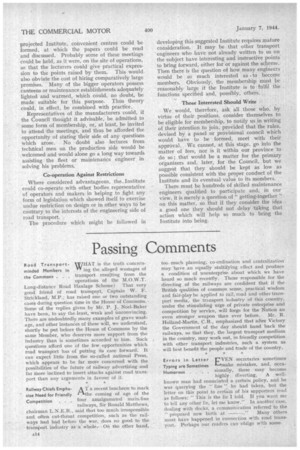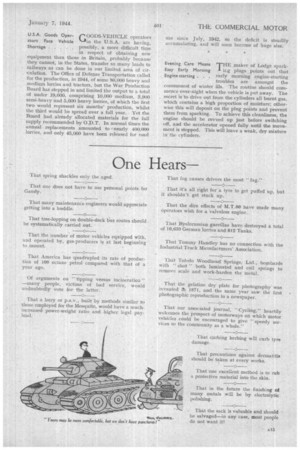Passing Comments
Page 16

Page 17

If you've noticed an error in this article please click here to report it so we can fix it.
Road TransportWHAT is the truth concernminded Members in " ing the alleged wastages of the Commons . . transport. resulting from the
operations of the M.O.W.T. Long-distance Road Haulage Scheme? That very good friend of road transport, Captain W. F. Strickland, M.P., has raised one or two outstanding cases during question time in the House of Commons.. Some of the replies given by Mr. P. J. Noel-Baker have been, to say the. least, weak and Unconvincing. There are undoubtedly many examples -of grave wastage, and other instances of these will, we understand, shortly be put before the House of Commons by the same Member, who deserves more support from the industry than is sometimes accorded to him. Such questions afford one of the few opportunities which road transport has of putting its case forward. It can expect little from the so-called national Press, which appears to be far more concerned with the possibilities of the future of railway advertising and far More inclined to insert attacks against road transport than any arguments in favour of it.
Railway Chiefs EmphaA T a recent luncheon to 'nark size Need for Friendly i—kthe coming of age of the Competition . . . four amalgamated mainline railways, Sir Ronald Matthews, chairman L.N.E.R., said that too much irresponsible and often cut-throat competition, such as the railways had had before the war, does. no good to the transport industry as 'a 'whole,On the other hand,
too, much planning', co-ordination and centralization may have an equally stultifying effect and produce a condition of unenterprise about which we have heard so much recently. Those responsible for the directing of the railways are confident that if the British qualities of common sense, practical wisdom and fair-play be applied to rail, road and other transport media, the transport industry of this country, under the stimulating urge of private enterprise and competition by service, will forge for the Nation an even stronger weapon than ever before. Mr. R. Holland-Martin, C.I3., emphasized that after Victory the Government of the day should hand back the railways, so that they, the largest transport medium in the country, may work out, in friendly, competition with other transport industries, such a system as will best benefit the people and trade of the country.
Errors in Letter Typing are Sometimes Humorous . . . . EVEN secretaries sometimes .1—amake mistakes, and, occasionally, these may become highly diverting. A . wellknown man had enunciated a certain policy, and he was. querying the " line " he had taken, but the letter on this point to certain of his supporters read as follows: " This is the lie I told. If you Want me to tell any other lie, let me know." In another case, dealing With decks, a commtinication referred' to the " proposed new birth at ." Many others must have happened in connection with road transport. -Perhaps 'our readers can -oblige with some. GOODS-VEHICLE operators in the U.S.A. are having, possibly, a more difficult time in respect of obtaining new • equipment than those in Britain, probably because they cannot, in the States, transfer so many loads to railways as can be done in our limited area of circulation. The Office of Defense Transportation called for the production, in 1944, of some 80,000 heavy and medium lorries and tractors, but the War Production Board has stepped in and limited the output to a total of under 19,000, comprising 10,000 medium, 3,900 semi-heavy and 5,000 heavy lorries, of which the first two would represent six months' production, whilst the third would be spread over a full year. Yet the Board had already allocated materials for the full supply recommended by O.D.T. In normal times the annual replacements amounted to nearly 400,000 lorries, and only 45,000 have been released for road
U.S.A. Goods Operators Face Vehicle Shortage use since July, 1942, so the deficit is steadily accumulating, and will soon become of huge size.
Evening Care Means THE maker of Lodge spark Easy Early Morning nig plugs points out that Engine starting . . early morning engine-starting troubles are amongst the commonest of winter ills. The routine should commence over-night when the vehicle is put away. The secret is to drive out from the cylinders all burnt gas, which contains a high proportion of moisture; otherwise this will deposit on the plug points and prevent them from sparking. To achieve this cleanliness, the engine should be revved up just before switching off, and the accelerator opened fully until the movement is stopped. This will leave a weak, dry mixture in the cylinders.




















































